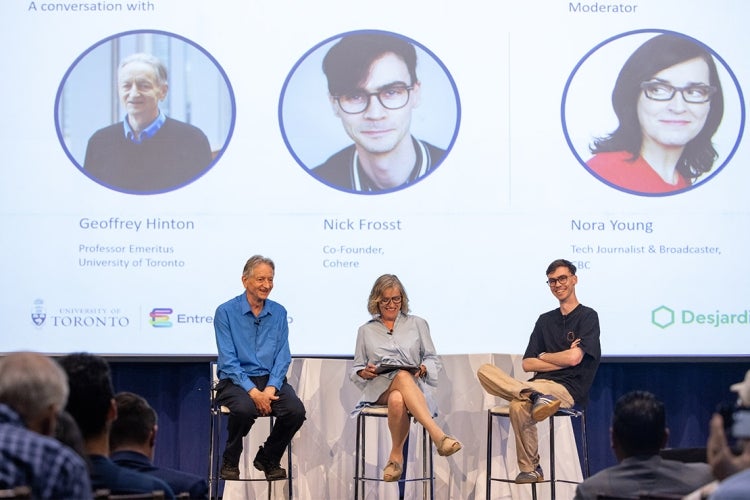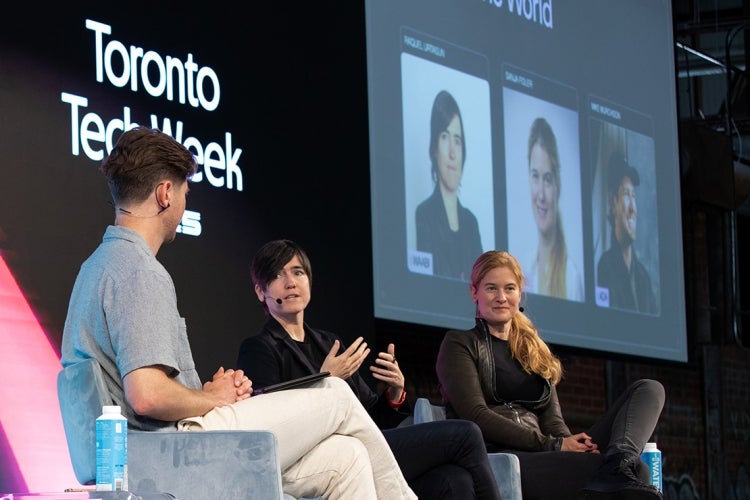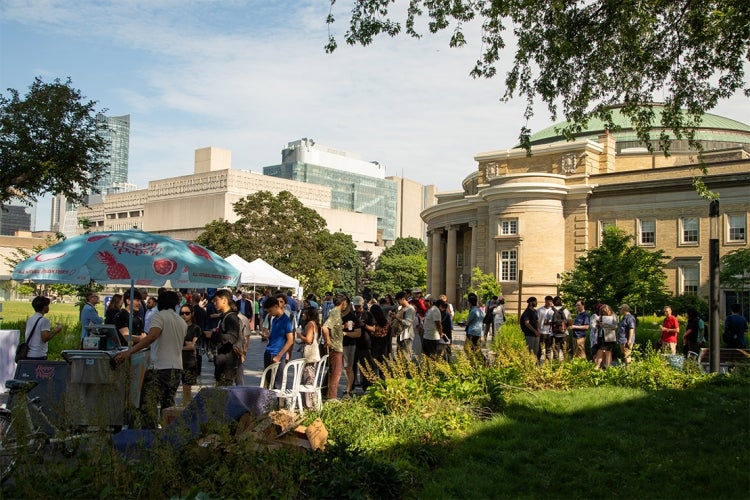Does artificial intelligence have subjective experience? Could AI outsmart and outmanoeuvre humans? What can Canada do to ensure it remains a leader in the global AI race that it helped kickstart?
These were some of the questions addressed by the University of Toronto's Geoffrey Hinton - a University Professor emeritus of computer science and recipient of the 2024 Nobel Prize in Physics - during a recent lecture and fireside chat held at Convocation Hall during the inaugural Toronto Tech Week .
The Desjardins Speaker Series event saw the "godfather of AI" put forth two of his most compelling and controversial contentions: that large language models (LLMs) such as ChatGPT and others understand language - rather than merely regurgitate it - and that AI could pose an existential risk to humanity.
The lecture culminated in a lively exchange between Hinton and his former protégé Nick Frosst, a U of T alumnus and co-founder of AI language processing startup Cohere. The pair discussed and debated the promise and risks of the transformative technology.
On the subject of understanding, Hinton insisted LLMs can have subjective experience and are "quite close to [humans]" in terms of consciousness. Frosst, on the other hand, characterized such systems as "more conscious than a rock and less conscious than a tree."
"It is very difficult to come on stage and disagree with a Nobel laureate," he later joked, prompting laughter from the audience.

The conversation, moderated by CBC tech journalist Nora Young, was among the most anticipated at Toronto Tech Week, which ran from June 23-27 and featured a range of U of T community members from Toronto's thriving AI and tech ecosystem.
"At the heart of that ecosystem sit our region's excellent universities, with the University of Toronto the main catalyst," said U of T President Meric Gertler in his introductory remarks, pointing to tech magazine BetaKit's inaugural "Most Ambitious" list highlighting tech founders and companies - a third of whom were connected to U of T.

President Gertler cited the Vector Institute for Artificial Intelligence - which Hinton co-founded - and the new Schwartz Reisman Innovation Campus as prime examples of U of T's role as a key node in Toronto's tech and innovation ecosystem. "The potential for discovery, invention and innovation at U of T and in the Toronto region is huge and inspiring," he said.
The event also saw Desjardins announce the renewal of its commitment as lead partner of U of T Entrepreneurship , with the financial institution set to continue supporting the Desjardins Speaker Series, the Desjardins Startup Prize - part of the annual U of T Entrepreneurship Week - and financial literacy workshops for a further three years.
During his lecture, Hinton traced the evolution of LLMs from his early experiments in the 1980s to today's powerful systems. He then set out his argument that LLMs understand language and have subjective experiences, drawing on elements of philosophy, neuroscience and computer science to make his case.
He also reiterated his warning about the risks posed by AI, outlining two major concerns: the misuse of AI by bad actors, and the possibility of super-intelligent AI systems acting independently of human control.
Hinton later expressed concern about tech companies resisting AI regulations, comparing their stance to oil companies opposing environmental oversight. He noted that without adequate regulation, AI agents could cause problems in a number of ways. For example, he said, "they will be able to [invent] creative new ways of finding people's passwords."
He also suggested AI systems could have a major impact on the job market in the coming years.
Frosst, for his part, agreed on the importance of AI safety, but took issue with Hinton's view on the extent and specific nature of the risks.

The conversation also touched on Canada's place in the global AI revolution. Hinton praised recent initiatives such as the Canadian Sovereign AI Compute Strategy , but called for more proactive engagement across the business sector and government.
Frosst voiced optimism about Canada's AI future.
"We invented this technology," he said, noting Hinton's foundational contributions to the field. "Canada has every right to be a leader in it."






